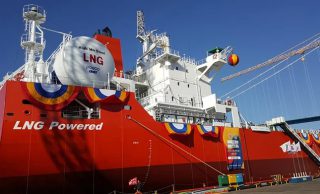SEA\LNG, a coalition promoting the use of liquefied natural gas as a marine fuel, has been joined by the German provider of large-bore diesel and gas engines and turbomachinery MAN Diesel & Turbo.
MAN’s technical expertise will augment those of existing SEA\LNG member OEMs (original equipment manufacturers) Wärtsilä and GTT, SEA\LNG said in a statement.
MAN’s increased focus in the field of converting existing vessels to operate using LNG fuel is exemplified in its pivotal role in the world’s first conversion of a container ship’s propulsion system from heavy fuel oil (HFO) to LNG. The dual-fuel conversion saw the 1,036 TEU feeder container ship Wes Amelie retrofitted in August 2017 to a multi-fuel, four-stroke unit that enables dual-fuel operation.
In October 2017, MAN pledged a €2M (US$2.3M) discount to convert 10 HFO engines into gas engines as part of its drive to find clean solutions for seaborne trade and transportation.
Peter Keller, SEA\LNG chairman and executive vice president, Tote, said, “Combining expertise in infrastructure, finance, regulation, and technical areas are all essential if LNG is going to fulfill its full potential as a marine fuel today and into the future. We welcome the opportunity to leverage MAN’s in-depth knowledge of, and extensive understanding in the fields of propulsion as we continue to support the energy transition in shipping.”
The addition of MAN to the coalition further strengthens SEA\LNG’s collaborative membership which continues to leverage knowledge, networks, and real-life examples to obtain a competitive global LNG value chain for cleaner maritime shipping.
SEA\LNG recently voiced its support for the level of ambition outlined by the IMO’s Initial Strategy of reducing greenhouse gas (GHG) emissions by at least 50 percent by 2050, compared to 2008 levels, and stressed the importance of LNG in supporting its achievement.
LNG is ready now as a solution to local emissions requirements, and as a pragmatic bridge to a zero-carbon future. It far outperforms conventional marine fuels in terms of minimizing local emissions to improve air quality and can significantly reduce greenhouse gas (GHG) emissions, SEA\LNG said in its statement.
And in combination with efficiency measures being developed for new ships in response to the IMO’s Energy Efficiency Design Index (EEDI), LNG will provide a way of meeting the IMO’s decarbonization target of a 40 percent decrease by 2030 for international shipping.
The coalition believes that the decision adopted by the IMO’s Marine Environmental Protection Committee (MEPC) during its recent 72nd session underlines how essential LNG as a marine fuel is as a commercially viable bridging solution to a zero-emissions shipping industry, while enabling it to comply with the immediate regulatory demands of the IMO 2020 global sulphur cap.


